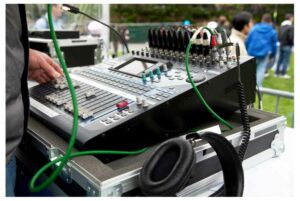Who Repairs Church Sound Systems: A Comprehensive Guide
The resonating notes of a choir, the clarity of a preacher’s sermon, and the spiritual ambiance created by the music – all of these are integral components of a church service. Churches rely on sophisticated sound systems to ensure these elements are experienced. Yet, church sound systems can experience glitches and breakdowns like any other technology. This comprehensive guide explores the nuances of church sound systems, answers questions like “Who repairs church sound systems?” and provides insights into securing grants for church sound systems, ensuring your worship experience remains uninterrupted.
Understanding Church Sound Systems

Components of a Church Sound System
A church sound system is not just a simple microphone and speaker setup. It’s a complex ensemble of components working harmoniously to deliver crystal-clear sound to the congregation. Here are the key elements:
1. Microphones: These capture the voices of the clergy, choir, and musicians. Different types of microphones, such as dynamic and condenser, are used depending on the application.
2. Mixer: The heart of the sound system, where audio from various sources is combined and adjusted. It allows for volume control, equalization, and effects processing.
3. Amplifiers: These boost the audio signal to be strong enough for the speakers.
4. Speakers: These convert the amplified signal back into audible sound. In churches, various speakers achieve optimal sound distribution, including floor monitors, line arrays, and ceiling speakers.
5. Soundboard: Also known as a mixing console, this is where sound engineers manage the audio inputs and outputs.
Special Requirements for Church Acoustics
Church acoustics present unique challenges for sound systems. With its high ceilings and reflective surfaces, the architecture can create acoustic issues such as echoes and reverberation. Churches usually incorporate acoustic treatments like baffles, diffusers, and absorbers to address these challenges. Finding the best digital mixer for your small church becomes essential as it is crucial in optimizing sound quality amidst these acoustic considerations.
Identifying Common Sound System Issues
Troubleshooting Audio Problems
Understanding the common issues that can plague church sound systems is the first step in determining when repairs are needed:
1. Microphone Feedback: That unpleasant, high-pitched squeal results from audio from the speakers re-entering the microphone. Proper microphone placement and equalization can help prevent feedback.
2. Speaker Distortion: If the sound coming from the speakers is distorted or unclear, it will be due to amplifier or speaker issues.
3. Wiring Problems: Loose or damaged cables can lead to sound interruptions. Regular cable maintenance is crucial.
4. Mixer Malfunctions: Problems with the mixer can result in poor sound quality or complete audio loss.
Signs Your System Needs Repair
Recognizing the signs that your church sound system requires attention can prevent minor issues from escalating:
1. Inconsistent Sound: If the audio quality varies during a service, it’s a sign that something is amiss.
2. Unwanted Noise: Any unexpected buzzing, crackling, or humming should be investigated.
3. Volume Fluctuations: Sudden changes in volume can disrupt the worship experience.
4. Equipment Overheating: Excessive heat from amplifiers or other components can indicate a problem.
Choosing the Right Repair Service

Professional Audio Technicians vs. DIY Repairs
When your church sound system needs repair, you have two options: professional audio technicians or DIY repairs. Here’s a closer look at both:
Professional Audio Technicians:
Bringing in an experienced audio technician offers several advantages:
- Expertise: They are trained to diagnose and repair various sound system issues.
- Experience: They have experience with church sound systems and understand the unique requirements.
- Quality Assurance: Professional repairs usually come with warranties, ensuring the issue is fully resolved.
Evaluating Expertise in Church Sound Systems
When selecting a repair service, consider the following factors to ensure they have expertise in church sound systems:
1. Experience: Ask about their experience with church sound systems precisely. Experienced technicians are more likely to understand the unique challenges.
2. References: Request references or reviews from other churches they’ve serviced.
3. Training: Inquire about their training and certifications in audio system repair.
4. Warranty: Ensure their repairs have a warranty for peace of mind.
Read More:- Top Small Church Sound Systems
The Repair Process Explained
Steps Involved in Sound System Repairs
Understanding the repair process can help alleviate any concerns you have:
1. Diagnosis: The technician will identify the root cause of the issue, whether it’s a faulty microphone, amplifier, or wiring.
2. Repairs: Once diagnosed, the technician will perform the necessary repairs, including replacing components, fixing wiring, or adjusting settings.
3. Testing: After repairs, thorough testing ensures the sound system functions flawlessly.
Preparing for the Technician’s Visit
Before the technician arrives, there are steps your church can take to expedite the repair process:
1. Document Issues: List the specific issues you’ve noticed with the sound system to provide the technician with a clear understanding of the problems.
2. Clear Access: Ensure the technician can easily access all sound system components.
3. Schedule Maintenance: Consider scheduling regular maintenance checks to prevent future issues.
Preventative Maintenance for Longevity

Regular Maintenance Schedules
Preventative maintenance is the key to ensuring the longevity of your church sound system. Here’s how to implement it:
1. Routine Inspections: Conduct regular visual inspections of all components to check for wear, loose connections, or signs of damage.
2. Cleaning: Keep the equipment clean from dust and debris, which can affect performance.
3. Cable Management: Properly manage and organize cables to prevent damage or interference.
Training Staff for Basic Sound System Care
Empower your church staff and volunteers to contribute to the sound system’s upkeep:
1. Basic Troubleshooting: Train staff to identify and report common issues.
2. Handling Equipment: Teach proper handling of microphones and other equipment to prevent accidental damage.
3. Emergency Protocols: Establish protocols for addressing sound system issues during services.
Conclusion
Church sound systems play a pivotal role in creating a spiritually enriching environment. Understanding their components, recognizing common issues, and knowing when to seek professional repairs are essential for maintaining the divine sound quality that every place of worship strives for. By implementing preventative maintenance and involving your church staff, you can ensure that your sound system continues inspiring and uplifting congregations for years.



